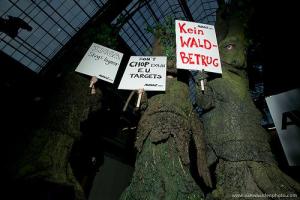A recent report by Greenpeace (“Why logging will not save the climate: the fallacy of GHG emissions reductions from so-called ‘Sustainable Forest Management’ (SFM) or Reduced Impact Logging (RIL) of natural forests”) evaluates greenhouse gases (GHG) emissions from the various forms of industrial logging.
The Green Economy
The Green Economy is a tactic used to “clean up” the image of corporations rather than address corporate capture and capitalism as the true drivers of deforestation. False solutions promoted under the Green Economy include certification, sustainable forest management, ecosystem services, REDD+, the bioeconomy, nature-based climate solutions, and zero net deforestation. Rather than stopping it, these “solutions” support corporate-driven destruction that is causing a deep social and ecological crisis.
Bulletin articles
27 February 2010
Other information
27 February 2010
An article published on the website EUobserver.com (1) informs that “a draft commission communication offering guidance to EU member states on the use of biofuels has classified palm oil plantations - the source of one of the most destructive forms of biofuels - as "forests." Essentially, the document argues that because palm oil plantations are tall enough and shady enough, they count as forests.”
Bulletin articles
27 February 2010
Reduced emissions from deforestation and forest degradation (REDD) is based on a simple idea: Making forests worth more alive than dead. But on closer examination, it is not simple at all. To forest peoples, forests already are worth more alive than dead. REDD could involve the biggest ever transfer of control over forests – to international carbon financiers and polluting companies.
Bulletin articles
30 January 2010
The Copenhagen Accord - the agreement reached by a group of countries at the Copenhagen Climate Change Summit and imposed on the rest - was defined by Transnational Institute’s Praful Bidwai as “a travesty of what the world needs to avert climate change”: The two degrees Celsius increase target in global temperature is 0.5 degrees above the target accepted by the majority of UN nations; poor countries are mainly left to fend for themselves in terms of adapting to climate change; and eventually, violations of the Copenhagen Accord w
Bulletin articles
30 December 2009
Before the plantations came, villagers in Teluk Kabung in Riau province in Sumatra, grew coconuts. A few years ago, thousands of hectares of forest surrounding the village were clearcut and replaced by acacia monocultures to supply Asia Pulp and Paper's massive operations. “As soon as they cut down the trees in the forest, the pests swarmed in, and ate our coconut trees,” a villager told Mitra Taj, a radio journalist from Living on Earth. Dozens of dead coconut trees lie on the ground near the village.
Other information
10 December 2009
By Rebecca Sommer
At the Climate Change Conference in Copenhagen, Indigenous participants are increasingly concerned about REDD.
REDD stands for “Reducing Emissions from Deforestation and Degradation”. The idea, as agreed by United Nations climate negotiators in Bali in 2007, is that because preserving forests is good for the climate, governments, companies or forest owners in the South should be rewarded for keeping them standing instead of cutting them down.
Bulletin articles
29 November 2009
It seems increasingly likely that no binding deal will come out of Copenhagen and that the North will attempt to scrap the Kyoto Protocol. It also seems likely that some sort of deal will be pushed through on reduced emissions from deforestation and forest degradation (REDD). There is a serious danger that REDD will act as greenwash for the North's failure to reduce emissions dramatically.
Other information
29 November 2009
There is nothing like creating a problem for finding a good business opportunity . Or at least this is so for seasoned business men and women. It is thus that behind wars one can easily find the arms business. Behind citizen insecurity -largely resulting from social and economic inequity- is the business of security: insurance monitoring systems, bars, alarms and heavy-handed “saviour” politicians. Behind disease is the “health” business: the drug industry and corporate medical power.
Other information
29 November 2009
There is no doubt that public opinion has become aware of the climate change issue. However, for most people this is but a headline in the newspapers and they tend to think that although this is in fact a major problem, there is no need to worry about it because the UN is working to solve it and that surely science will invent something to prevent it from happening.
Bulletin articles
30 September 2009
In the area of tree plantations, the FSC has become the main body responsible for granting a certificate to plantations assessed as “environmentally responsible, socially beneficial and economically viable.”
The insurmountable problem of this “green seal” granted by the FSC is that it certifies what intrinsically can never be either socially beneficial or environmentally sustainable: large scale monoculture tree plantations.
Bulletin articles
30 September 2009
This lie has its roots in the failure of the UN Framework Convention on Climate Change (UNFCCC) to differentiate between forests and plantations. "Forest" according to UNFCCC is an area larger than 500 square metres, at least 10 per cent of which covered in trees that can grow to more than two metres high. To UNFCCC, then, there is no difference between a monoculture eucalyptus plantation, a severely degraded forest and an intact old-growth native forest.
Bulletin articles
30 August 2009
While for the majority of humanity climate change spells disaster, a few corporate-minded people perceive it as a good business opportunity. The way they see it, climate change is about carbon emissions and carbon can be traded as a commodity in the global market. This market – so they say – can be worth billions or even trillions of dollars and they expect it to bring them huge profits.

